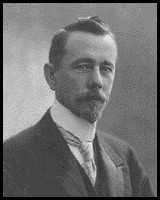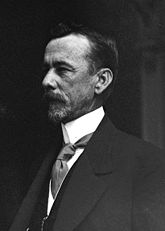
Lauro Müller
Encyclopedia
Lauro Severiano Müller was a Brazil
ian politician, diplomat, and military engineer. Responsible for the transition of Santa Catarina
from a province to a state, he is also recognised as one of those who helped achieve the Brazilian diplomatic victory over Bolivia
through the Treaty of Petrópolis
, which allowed for the purchase of Acre
and its incorporation into Brazil.
Müller occupied the 34th chair of the Brazilian Academy of Letters
from 1912 until his death in 1926.
 Born in Itajaí
Born in Itajaí
, Santa Catarina, he was the son of the German immigrants
Peter Müller and Anna Michels, originally from the Rhineland
. On his mother's side, his first cousin was Filipe Schmidt, who also served two terms as President of Santa Catarina. A passionate follower of Benjamin Constant
's positivism in his youth, he embarked on a military career in his native province after a brief stint in a merchant's office.
His political career began in 1889, when the first President of Brazil
, Deodoro da Fonseca
, made him President of Santa Catarina and charged him with organising the province that had been transformed into a state.
Later, he served as a federal deputy, senator (1899–1926), member of the Academy of Letters
(1912–1926), and minister of state. He carried out great reforms while holding the ministerial portfolios of Industry, Transport and Public Works, during the presidency of Rodrigues Alves
. As Minister of Foreign Affairs a post he assumed in 1912 upon the untimely death of the Barão do Rio Branco
, he pursued economic integration with Argentina
and Chile
. He was forced to resigned in 1917 because Brazil had entered World War I
on the side of the Allies
, and anti-German sentiment created opposition to him due to his German roots. He was elected President of Santa Catarina again in 1918, but preferred to remain a senator.
During an official visit to the U.S. as Minister of Foreign Affair, he was offered the title of Doctor Honoris Causa by Harvard University
. He was also made an honorary samurai on an official visit to Japan.
The positions he held in his long political career include:
Member of the Constitutional Assembly
Member of Congress
Governor of the State
Minister of Public Works
General of the Army
Minister of Foreign Affairs
Senator of the Republic
He became popular for his important public works, such as the construction of Rio de Janeiro
's Avenida Central, today Avenida Rio Branco, and improvements to that city's port. He died in Rio in 1926.
Brazil
Brazil , officially the Federative Republic of Brazil , is the largest country in South America. It is the world's fifth largest country, both by geographical area and by population with over 192 million people...
ian politician, diplomat, and military engineer. Responsible for the transition of Santa Catarina
Santa Catarina (state)
Santa Catarina is a state in southern Brazil with one of the highest standards of living in Latin America. Its capital is Florianópolis, which mostly lies on the Santa Catarina Island. Neighbouring states are Rio Grande do Sul to the south and Paraná to the north. It is bounded on the east by...
from a province to a state, he is also recognised as one of those who helped achieve the Brazilian diplomatic victory over Bolivia
Bolivia
Bolivia officially known as Plurinational State of Bolivia , is a landlocked country in central South America. It is the poorest country in South America...
through the Treaty of Petrópolis
Treaty of Petrópolis
The Treaty of Petrópolis, signed on November 11, 1903, ended tensions between Bolivia and Brazil over the then-Bolivian territory of Acre , a desirable territory during the contemporary rubber boom....
, which allowed for the purchase of Acre
Acre (state)
Acre is one of the 27 states of Brazil. It is situated in the southwest of the Northern Region, bordering Amazonas to the north, Rondônia to the east, Bolivia to the southeast and the Ucayali Region of Peru to the south and west. It occupies an area of 152,581.4 km2, being slightly smaller...
and its incorporation into Brazil.
Müller occupied the 34th chair of the Brazilian Academy of Letters
Academia Brasileira de Letras
Academia Brasileira de Letras is a Brazilian literary non-profit society established at the end of the 19th century by a group of 40 writers and poets inspired by the Académie Française. The first president, Machado de Assis, declared its foundation on December 15, 1896, with the statutes being...
from 1912 until his death in 1926.
Biography

Itajaí
Itajaí is a Brazilian city in the state of Santa Catarina.-History:The city was founded on June 15, 1860, but the colonization of Itajaí started in 1658, when the Paulista João Dias D’Arzão arrived in the region. In 1750, Portuguese colonists coming from Madeira and the Azores made this region...
, Santa Catarina, he was the son of the German immigrants
German-Brazilian
A German Brazilian is a Brazilian person of ethnic German ancestry or origin...
Peter Müller and Anna Michels, originally from the Rhineland
Rhineland
Historically, the Rhinelands refers to a loosely-defined region embracing the land on either bank of the River Rhine in central Europe....
. On his mother's side, his first cousin was Filipe Schmidt, who also served two terms as President of Santa Catarina. A passionate follower of Benjamin Constant
Benjamin Constant
Henri-Benjamin Constant de Rebecque was a Swiss-born French nobleman, thinker, writer and politician.-Biography:...
's positivism in his youth, he embarked on a military career in his native province after a brief stint in a merchant's office.
His political career began in 1889, when the first President of Brazil
President of Brazil
The president of Brazil is both the head of state and head of government of the Federative Republic of Brazil. The president leads the executive branch of the federal government and is the commander-in-chief of the Brazilian Armed Forces...
, Deodoro da Fonseca
Deodoro da Fonseca
Marshal Manuel Deodoro da Fonseca became the first president of the Republic of Brazil after heading a military coup that deposed Emperor Pedro II and proclaimed the Republic in 1889, disestablishing the Empire of Brazil.- Biography :...
, made him President of Santa Catarina and charged him with organising the province that had been transformed into a state.
Later, he served as a federal deputy, senator (1899–1926), member of the Academy of Letters
Academia Brasileira de Letras
Academia Brasileira de Letras is a Brazilian literary non-profit society established at the end of the 19th century by a group of 40 writers and poets inspired by the Académie Française. The first president, Machado de Assis, declared its foundation on December 15, 1896, with the statutes being...
(1912–1926), and minister of state. He carried out great reforms while holding the ministerial portfolios of Industry, Transport and Public Works, during the presidency of Rodrigues Alves
Francisco de Paula Rodrigues Alves
Francisco de Paula Rodrigues Alves, PC was a Brazilian politician who first served as governor of the State of São Paulo in 1887, and as Treasury minister in the 1890s. Rodrigues Alves was elected president of Brazil in 1902 and served until 1906....
. As Minister of Foreign Affairs a post he assumed in 1912 upon the untimely death of the Barão do Rio Branco
Barão do Rio Branco
José Maria da Silva Paranhos, Jr., 1st Baron of Rio Branco was a Brazilian diplomat, geographer, historian, politician and professor, considered to be the "father of Brazilian diplomacy". He was the son of famous statesman José Maria da Silva Paranhos, Sr....
, he pursued economic integration with Argentina
Argentina
Argentina , officially the Argentine Republic , is the second largest country in South America by land area, after Brazil. It is constituted as a federation of 23 provinces and an autonomous city, Buenos Aires...
and Chile
Chile
Chile ,officially the Republic of Chile , is a country in South America occupying a long, narrow coastal strip between the Andes mountains to the east and the Pacific Ocean to the west. It borders Peru to the north, Bolivia to the northeast, Argentina to the east, and the Drake Passage in the far...
. He was forced to resigned in 1917 because Brazil had entered World War I
World War I
World War I , which was predominantly called the World War or the Great War from its occurrence until 1939, and the First World War or World War I thereafter, was a major war centred in Europe that began on 28 July 1914 and lasted until 11 November 1918...
on the side of the Allies
Allies of World War I
The Entente Powers were the countries at war with the Central Powers during World War I. The members of the Triple Entente were the United Kingdom, France, and the Russian Empire; Italy entered the war on their side in 1915...
, and anti-German sentiment created opposition to him due to his German roots. He was elected President of Santa Catarina again in 1918, but preferred to remain a senator.
During an official visit to the U.S. as Minister of Foreign Affair, he was offered the title of Doctor Honoris Causa by Harvard University
Harvard University
Harvard University is a private Ivy League university located in Cambridge, Massachusetts, United States, established in 1636 by the Massachusetts legislature. Harvard is the oldest institution of higher learning in the United States and the first corporation chartered in the country...
. He was also made an honorary samurai on an official visit to Japan.
The positions he held in his long political career include:
Member of the Constitutional Assembly
Member of Congress
Governor of the State
Minister of Public Works
General of the Army
Minister of Foreign Affairs
Senator of the Republic
He became popular for his important public works, such as the construction of Rio de Janeiro
Rio de Janeiro
Rio de Janeiro , commonly referred to simply as Rio, is the capital city of the State of Rio de Janeiro, the second largest city of Brazil, and the third largest metropolitan area and agglomeration in South America, boasting approximately 6.3 million people within the city proper, making it the 6th...
's Avenida Central, today Avenida Rio Branco, and improvements to that city's port. He died in Rio in 1926.

